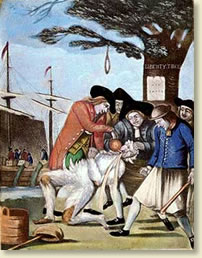THE AMERICAN TAXPAYER TEA PARTY 2009
Victory in the French and Indian War was costly for the British. At the war's  conclusion in 1763, King George III and his government looked to taxing the American colonies as a way of recouping their war costs. They were also looking for ways to reestablish control over the colonial governments that had become increasingly independent while the Crown was distracted by the war. Royal ineptitude compounded the problem. A series of actions including the Stamp Act (1765), the Townsend Acts (1767) and the Boston Massacre (1770) agitated the colonists, straining relations with the mother country. But it was the Crown's attempt to tax tea that spurred the colonists to action and laid the groundwork for the American Revolution.
conclusion in 1763, King George III and his government looked to taxing the American colonies as a way of recouping their war costs. They were also looking for ways to reestablish control over the colonial governments that had become increasingly independent while the Crown was distracted by the war. Royal ineptitude compounded the problem. A series of actions including the Stamp Act (1765), the Townsend Acts (1767) and the Boston Massacre (1770) agitated the colonists, straining relations with the mother country. But it was the Crown's attempt to tax tea that spurred the colonists to action and laid the groundwork for the American Revolution.
 Colonialists attack, tar and feather a hapless tax collector |
The colonists were not fooled by Parliament's ploy. When the East India Company sent shipments of tea to Philadelphia and New York the ships were not allowed to land. In Charleston the tea-laden ships were permitted to dock but their cargo was consigned to a warehouse where it remained for three years until it was sold by patriots in order to help finance the revolution.
In Boston, the arrival of three tea ships ignited a furious reaction. The crisis came to a head on December 16, 1773 when as many as 7,000 agitated locals milled about the wharf where the ships were docked. A mass meeting at the Old South Meeting House that morning resolved that the tea ships should leave the harbor without payment of any duty. A committee was selected to take this message to the Customs House to force release of the ships out of the harbor. The Collector of Customs refused to allow the ships to leave without payment of the duty. Stalemate. The committee reported back to the mass meeting and a howl erupted from the meeting hall. It was now early evening and a group of about 200 men disguised as Indians assembled on a near-by hill. Whopping war chants, the crowd marched two-by-two to the wharf, descended upon the three ships and dumped their offending cargos of tea into the harbor waters.
Most colonists applauded the action while the reaction in London was swift and vehement. In March 1774 Parliament passed the Intolerable Acts which among other measures closed the Port of Boston. The fuse that led directly to the explosion of American independence was lit.WE WILL NOT STAND FOR TYRANNY. REMEMBER YOU WORK FOR US
COPY AND SEND TO 1600 PENNSYLVANIA AVE APRIL 1ST SO IT WILL ARRIVE BY APRIL 15TH



0 Comments:
Post a Comment
Subscribe to Post Comments [Atom]
<< Home